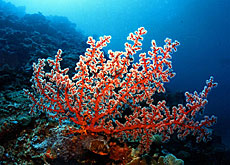Global warming could threaten ocean life

Swiss scientists have contributed to an alarming new study that suggests global warming could have a devastating effect on marine life in the next 50 years.
The findings reveal that coral and plankton in the waters around the southern polar region are far more at risk to carbon dioxide (CO2) emissions than previously thought.
Scientists from Bern University’s Climate and Environmental Physics department took part in the international project. It measured the chemical changes in the Southern Ocean caused by the absorption of CO2.
They found that the resulting increased acidity in these waters dissolves calcium carbonates that corals and plankton use to make protective external skeletons, according to research scientist Gian-Kasper Plattner.
The tiny plankton are an essential part of the ocean food chain, forming the basic diet of many fish and whales.
“CO2 has a tremendous impact on the chemical state of the ocean, and this in turn could have a damaging impact on the ecosystem,” Plattner told swissinfo.
“This might have serious consequences not just for these little creatures, but also on creatures that are important to us, such as fish and whales.”
But Plattner cautioned against overstating the results of the study which were published in the scientific journal Nature. “It is hard to say from one experiment that the oceans are going to die.”
Warning
Similar experiments carried out in warmer seas projected that corals and plankton would not be seriously affected for centuries.
But as colder waters contain less calcium carbonates than warmer areas, the new Ocean Carbonate Cycle Inter-Comparison Project (OCMIP) results indicate that there could be severe consequences for these organisms within 50-100 years.
Plattner, who took part in the study along with Bern University colleague Fortunat Joos, said the findings sent out a renewed warning for the world to reduce CO2 emissions.
He added that levels of the gas in the atmosphere are now so high that it would still take more than a generation for the planet to recover, even if further emissions were to be cut immediately.
“But even if we do something today it might not have an impact for another 100 years as levels are so high.”
CO2 emissions
WWF Switzerland agreed with the findings of the scientists.
“It is obvious that climate change has an extremely damaging effect on marine life,” Adrian Stiefel of WWF Switzerland told the Swiss tabloid newspaper Blick.
Previously it was believed that the oceans manage to absorb about a quarter of the global CO2 emissions.
The gas, which remains in the atmosphere, leads to the phenomenon known as global warming. The level of CO2 emissions has increased steadily over recent decades.
swissinfo, Matthew Allen
OCMIP started in 1995 and has just moved into the third phase of its research.
The latest results, from the second phase of the project (1998-2002), have been published in Nature magazine.
The project team is made up of scientists from Europe, US, Japan and Australia.

In compliance with the JTI standards
More: SWI swissinfo.ch certified by the Journalism Trust Initiative











You can find an overview of ongoing debates with our journalists here . Please join us!
If you want to start a conversation about a topic raised in this article or want to report factual errors, email us at english@swissinfo.ch.